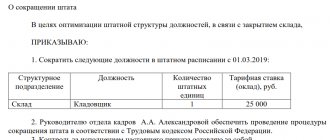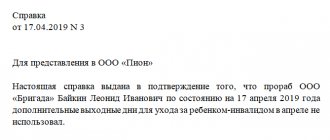Home / Labor Law / Dismissal and layoffs / Retrenchment
Back
Published: 05/09/2017
Reading time: 7 min
0
5456
2016 was marked by a difficult economic situation in the country and a deterioration in the general financial situation of citizens, and, accordingly, employers. In times of serious crisis, one of the ways to keep an enterprise profitable is to reduce the organization's staff in accordance with the current legislation of the country.
Sometimes, when downsizing, retirees are fired first, offering them a pension or additional benefits as an experienced worker who leaves the state. In our article we will analyze in detail all the legislative nuances and describe the main aspects of the dismissal of pensioners during staff reductions.
- Legislation
- Guarantees for pensioners in the event of staff reductions
- Pensioner reduction process
- Payments
Dear readers! To solve your problem, call hotline 8 or ask a question on the website. It's free.
Ask a Question
Is it possible to lay off a pensioner due to staff reduction?
Reaching retirement age and obtaining the right to stop working does not mean that the pensioner loses the opportunity to work and receive money for it. An elderly person has the right to retire, but he is not obliged to do so. In general, in Russia all citizens have the right to employment except representatives of some special categories of disabled people and minors.
Since pensioners are subject to the same rules as other subordinate companies, staff reductions may affect them too - the law allows the dismissal of a pensioner due to the exclusion of a position from the staffing table or due to the need to reduce the number of employees. However, the reasons for which the dismissal of an elderly person is formalized should not be imaginary - the desire to simply get rid of an elderly employee is not encouraged by law. The reason for dismissal may be:
- optimization of labor resources by the manager in order to increase labor productivity;
- change in the scope of the company's activities;
- staff reduction to reduce production volumes;
- reorganization at the enterprise.
Pensioners who continue to work have the following privileges:
- the law prohibits age discrimination against retired workers;
- the right to work even upon reaching retirement age;
- preferential right to remain at work in case of staff reduction if the pensioner is highly qualified, has sufficient knowledge and work experience, takes an active part in increasing production indicators and continues to successfully cope with his responsibilities;
- additional leave at your own expense at any time of the year without taking into account the vacation schedule lasting 14 calendar days;
- no need to work the 2 weeks required for other employees upon dismissal on their own initiative on the basis of the right to retire.
Is it possible to lay off a pensioner due to staff reduction: what does the Labor Code of the Russian Federation say?
Part 2 art. 3 of the Labor Code of the Russian Federation establishes a ban on restricting or infringing on the rights of employees due to age or on other grounds that do not relate to professional or business qualities. Accordingly, pensioners work under employment contracts on a general basis, and infringement of their labor rights due to age or health status is not allowed.
The only exception to this rule are government employees. According to Part 2 of Art. 39 Federal Law “On State...” dated July 27, 2004 No. 79-FZ, when a civil servant reaches the maximum age for service (65 years) is grounds for dismissal. However, for some categories of civil servants, exceptions are provided when the age limit for service can be extended based on a decision of the head of the body in which the employee serves (Part 1, Article 25.1 of Federal Law No. 79).
What are the rules for reducing a pensioner?
The reduction of pensioners in 2020 is carried out according to the general rules defined by Art. 179 and 180 of the Labor Code of the Russian Federation, without any restrictions or exceptions.
When an employee is laid off, in accordance with Part 1 of Art. 179 of the Labor Code of the Russian Federation, only his qualifications and labor productivity are taken into account. Accordingly, preference should be given to a more qualified and efficient employee.
At the same time, in a number of organizations, employees may have the same labor productivity (this indicator is not applicable to a number of professions and positions) and qualifications. In such a situation, the employees listed in Part 2 of Art. 179 of the Labor Code of the Russian Federation, including:
- employees with two or more dependents;
- employees whose family no longer works;
- employees who, while serving with the employer, received an occupational disease or injury;
- disabled people of the Second World War and combat operations;
- improving their qualifications in the direction of the employer without interrupting their work.
Important! Pensioners by virtue of Part 2 of Art. 179 of the Labor Code of the Russian Federation will not enjoy the preferential right to remain at work when staffing positions are reduced. That is, when a choice arises between dismissal due to reduction of a pensioner or a younger employee, preference should be given to the more qualified and effective of them.
Conditions under which a pensioner is laid off due to staff reduction
As you know, employees who learn about their imminent dismissal due to staff reduction have the right to ask for early dismissal - 2 months before the expected settlement date. And pensioners may resign even earlier, since it may be more profitable for them to formalize leaving work under clause 2, part 1, art. 81 Labor Code of the Russian Federation.
When being dismissed due to staff reduction, a pensioner who wishes to resign early must draw up a statement in such a way that the resignation is not regarded as dismissal on his own initiative.
The only difference between a pensioner and an employee who has not reached retirement age when dismissed due to a reduction in position or staff size is the impossibility of assigning the status of unemployed. A pensioner cannot be recognized as unemployed, since he has the right not to get a job anymore, but simply to receive a pension.
There may also be a difference in the list of required labor benefits upon dismissal due to staff reduction - depending on the social status and work experience, a pensioner may be entitled to an expanded range of preferences.
https://youtu.be/Nb5R4jNshbQ
The procedure for dismissing a pensioner
We remind you that the procedure for laying off pensioners when reducing staff is regulated by Art. 179, 180 Labor Code of the Russian Federation.
The first question that the organization’s administration needs to decide on is the list of positions and employees to be eliminated.
At large enterprises, a special commission is created for these purposes, the purpose of which is to carry out organizational and staffing measures in an economically feasible manner. The composition of the commission, powers and other issues of its activities are regulated by order of the head, and based on the results of the work, a report and recommendations are drawn up for the reduction of both positions and specific employees. Accordingly, issues of qualifications of specialists, their effectiveness, and the possibility of moving redundant employees to existing vacant positions must be taken into account during the work of the commission.
After the management of the organization has decided on the list of employees to be laid off, each of them must be offered other vacant positions in the organization, taking into account health requirements.
Part 3 art. 81 of the Labor Code of the Russian Federation obliges the administration to offer the entire list of available vacancies, including those with lower wages, lower positions that a particular pensioner can occupy, taking into account his qualifications and health status in a given area (usually within a specific administrative-territorial unit). Such a proposal should be made in writing, handed over to the employee against signature, and a reasonable period of time should be established for giving consent to the transfer or refusing it. Failure to agree to the transfer within the specified period should mean the employee refuses the transfer.
If the employee agrees, it is enough to make changes to the employment contract, which will be confirmed by the signatures of both parties. If the employee refuses the transfer, it is required to obtain appropriate documentary confirmation from him or wait until the end of the period specified in the offer.
How to notify a pensioner about layoffs
In parallel with offering the laid-off employee another job, Part 2 of Art. 180 of the Labor Code of the Russian Federation obliges the administration of the organization to notify the employee of the upcoming layoff. The pensioner must be warned about this individually and against receipt at least 2 months before the day of the proposed dismissal.
Important! It is necessary to warn the employee in such a way that the dismissal does not occur during the employee’s vacation. This is due to the fact that, according to Art. 81 of the Labor Code of the Russian Federation, it is unacceptable to dismiss an employee who is on vacation or sick leave.
Part 3 art. 180 of the Labor Code of the Russian Federation allows the employer, with the consent of the employee, to terminate the employment contract with him ahead of schedule, before the expiration of the 2-month period before the upcoming dismissal due to reduction. For the entire period remaining until the end of the layoff notice, the employee must be paid compensation in the amount of average earnings.
Clause 2 art. 25 Federal Law “On Employment...” dated April 19, 1991 No. 1032-1 obliges the employer-organization to also notify the employment center 2 months in advance about the upcoming layoff of workers. Individual entrepreneurs must send such notice no later than 2 weeks before dismissal.
The notification is drawn up in free form. In this case, you must include the following information about each employee:
- position and profession;
- qualification requirements for occupying a position;
- salary amount.
How to lay off a pensioner due to staff reduction
The reduction of a citizen of retirement age is carried out exactly according to the same scheme as in the general case.
The procedure for dismissing an elderly person involves the employer, HR employee and accountant going through the following steps:
- The employer announces a meeting of a commission consisting of department heads in order to organize a meeting regarding the reduction of positions and staff numbers. Confirmation of the convening of the commission is an order. The law does not oblige managers to hold a meeting, so the first stage is carried out at the discretion of the company owner.
- Based on the results of the commission, the employer issues an order on the planned staff reduction . It should contain a list of employees, positions and departments that have been laid off. The date of expected execution of the order is also stated.
- 2 months before the actual day of dismissal, employees who have been laid off must be notified by issuing a written notice of dismissal. It informs about the date of dismissal and the possibility of continuing work in another position (including lower ones) if there are open vacancies.
- 2-3 months before carrying out staff reduction measures, the employer informs the trade union organization and the employment service .
- Dismissed employees are given a dismissal order for signature.
- If the employee does not want to familiarize himself with the order, the employer draws up a separate act , which must be signed by witnesses.
- On the last working day, the employer invites laid-off employees to write a letter of resignation indicating the reason for termination of the employment relationship - “termination of the employment contract due to staff reduction.”
- An HR department employee familiarizes the employee with the personnel order (form T-8 and T-8a - when dismissing several subordinates). The employee signs it.
- The personnel department issues a work book . The accountant calculates the employee. If payment or issuance of a work book occurred later than the day of dismissal, the employee has the right to demand payment of compensation for the delay.
What does the law say?
In accordance with Article 37 of the Constitution of the Russian Federation, every person living on the territory of Russia has the right to work, of course, taking into account restrictions and guarantees.
In particular, minors can work only with the permission of their parents, and citizens over 18 years of age do not require permission, regardless of what category of population or social group they belong to.
Moreover, any restriction in work, both during hiring and dismissal due to the same age limit, is considered discrimination and is punishable by law.
That is, workers who have reached retirement age, within the framework of the law, have equal rights with all other categories of workers, both with regard to the rights to work and the observance of their rights upon termination of cooperation.
Normative base
Dismissal due to job reduction is regulated by the norms of Article 180 of the Labor Code of the Russian Federation, which defines the procedure for personnel optimization and also sets deadlines.
In particular, when deciding to terminate the employment relationship with an employee of retirement age, company management is obliged to offer another position, even with lower pay or minimum qualification requirements.
That is, perhaps a pensioner, for some reason, will no longer be able to work as a mechanic or economist, but he will be able to work as a watchman or accept applications by phone, which means the possibility of additional income will remain.
Also, in accordance with the stipulated article, if there is no suitable vacancy or the employee does not agree to take it, a notice of the upcoming dismissal must be given, no later than two months before the upcoming dismissal, not to mention a warning to the Trade Union Committee in accordance with Article 373 of the Labor Code of the Russian Federation, in if the dismissed employee is a member of it.
Is it possible to shorten?
According to the norms of the current legislation, the dismissal of a pensioner due to job reduction in connection with reaching retirement age is not allowed, since these actions are regarded as discrimination.
But if a pensioner’s vacancy is subject to reduction due to production processes, then it is permissible to terminate relations with this category of workers, because pensioners, by virtue of the law, are the same workers as everyone else, therefore, in their regard, the norms of the Labor Code of the Russian Federation apply in full.
Rights and guarantees
Despite the fact that employees of retirement age already have one of the state guarantees, namely a pension, as compensation for their many years of work, this category is also entitled to other benefits, as well as rights that must be respected regardless of the circumstances of staff optimization.
Preemptive right to leave
In particular, when working pensioners are laid off, the preferential right to remain, provided for in Article 179 of the Labor Code of the Russian Federation, applies to the same extent as to other employees.
That is, to begin with, labor productivity and qualifications must be taken into account, and only with equal indicators is family or social status considered. For example, a pensioner may have two dependents to support, which may be a pensioner wife and a disabled mother, who depend on him financially even if they have their own pension.
Or a pensioner may also be a disabled person who received a work injury or acquired an occupational disease during many years of work in the company. An employee may also be a combat veteran or a liquidator of the consequences of the Chernobyl Nuclear Power Plant, and, accordingly, have the right to preferential retention at work in accordance with Article 179 of the Labor Code of the Russian Federation and Article 14 of Federal Law No. 1244-1.
Labor Code of the Russian Federation
Law of the Russian Federation N 1244-1
Prohibition on dismissal of guardians
Not all pensioners, when they reach the legal age, lose strength and need rest; some of them, on the contrary, are not inferior in working capacity to young people.
Also, in some situations, pensioners can not only continue to work, but also be guardians, for example, of their grandchildren, whose parents are absent, and whose children are under 18 years of age or are disabled.
In such a situation, an employee of retirement age has the right, in accordance with Article 261 of the Labor Code of the Russian Federation, to have a kind of immunity to terminate the employment relationship, because in accordance with the stipulated article, if there are small dependent children and there are no family members with independent earnings, the dismissal of an employee is prohibited.
Early dismissal
According to the norms enshrined in Article 180 of the Labor Code of the Russian Federation, after receiving a notification, each employee has the right to terminate cooperation ahead of schedule, that is, before the expiration of a 2-month period. A working pensioner also has a similar right.
That is, in accordance with the agreed norm, the employee has the right to submit an application for termination of the legal relationship earlier than the established period while retaining the right to receive severance pay in an amount proportional to the remaining period before dismissal.
Early retirement
Taking into account the new pension legislation of the Russian Federation, namely Federal Law No. 400, every worker, upon reaching retirement age, has the right to continue working without applying for a pension, which will increase his pension coefficient and the size of the fixed payment, and therefore the size of his pension in the future.
That is, a citizen at 60 years old may not be a pensioner and he can be fired in connection with personnel optimization, in the manner prescribed by law.
But it happens that workers who have only a year left before receiving an old-age pension are also fired, despite their services to the company and extensive work experience, due to the fact that many institutions prefer to work with young and promising personnel, while People of pre-retirement age are not particularly popular.
And since it is not at all easy for an older worker to find a job on the eve of a pension at another enterprise, a special program is provided at the legislative level to protect citizens of this category.
In particular, Article 32 of Federal Law No. 1032-1 gives workers the right to receive an early pension if they:
- have a total work experience of 25 and 20 years for men and women, respectively;
- laid off due to staff optimization or company liquidation;
- have reached the ages of 58 and 53 years, that is, no more than two years remain until they receive the right to pension benefits.
By the way, in accordance with the stipulated article, citizens who have not reached retirement age can choose a benefit instead of a pension, which, due to their age, will be paid to them not for 12 months, but for 36, just before the pension is issued, and at the same time they will not lose the right to work and the labor exchange will be obliged to search for work for this category.
Federal Law of December 28, 2013 N 400-FZ
Law of the Russian Federation of April 19, 1991 N 1032-1
How to correctly draw up a dismissal order due to reduction? Information is in our article. Is it permissible for a single mother to be fired due to layoffs? Find out here.
Common mistakes
Error: The employer did not pay a pensioner who was laid off due to staff reduction, severance pay on the grounds that it was time for the employee to retire and he would not look for a new job.
Comment: Severance pay is paid to all employees dismissed due to staff reduction, including retirees, regardless of whether they are looking for a new job or not.
Error: A pensioner who does not want to get a job after being laid off due to staff reduction applies for severance pay for the second month after dismissal.
Comment: Average monthly earnings are maintained in the first 2 months after dismissal only if the dismissed employee begins to look for a new job and registers with the Employment Center.
Conditions for early retirement in case of staff reduction
There are very often cases when company management has to fire workers who have very little time left before receiving old-age benefits due to a revision of the number of employees. The law of the Russian Federation (Article 32 of the Federal Law) protects the rights of people of pre-retirement age, the reduction of which is inevitable. They are paid an early pension in case of staff reduction in the following conditions:
- age 58 (men) and 53 (women) – less than two years remain until retirement age;
- the reduction takes place due to the optimization or termination of the enterprise;
- there is a general period of work of 25 and 20 years.
In this case, the law of the country provides for the possibility for a person to choose not a pension, but a benefit. It is calculated for 36 months. The labor exchange is looking for work for these citizens, since they have not lost their right to work.
Answers to common questions about pensioner layoffs due to staff reduction
Question No. 1: Is it necessary to pay a pensioner dismissed due to staff reduction severance pay in the amount of average monthly earnings in the first 2 months after dismissal, if the pensioner does not intend to look for a new job?
Answer: Yes, these payments are mandatory both for pensioners laid off due to staff reduction and for young employees, but only if the pensioner registers with the Employment Center. If not, then he will receive severance pay only once, upon dismissal.
Question No. 2: Why are pensioners not given unemployed status after dismissal due to staff reduction, and how does this affect the possibility of receiving severance pay?
Answer: The status of unemployed can be assigned to able-bodied citizens, which pensioners are not from the moment they are assigned a pension benefit.
The absence of unemployed status means that the employer will not pay the pensioner a third severance pay if the dismissed employee does not find a job, and the Employment Center does not provide him with unemployment benefits, but will only help him find vacancies. Rate the quality of the article. Your opinion is important to us:
What are the advantages of pensioners
According to the provisions of the current Labor Code, pensioners are equal in rights and responsibilities to all other employees (Article 3 of the Labor Code of the Russian Federation).
But in some cases, retirement age guarantees certain benefits at work.
- According to the law, age cannot be a reason for refusal of employment (Article 64 of the Labor Code of the Russian Federation).
- A retired WWII veteran, if he continues to work, can choose the time for his vacation (Clause 1, Article 15-16 of Federal Law No. 5 of January 12, 1995).
- If desired, an employee of retirement age can take additional unpaid leave of up to 14 days.
- Working pensioners are exempt from paying property tax.
- Older employees receive certain preferences when purchasing vouchers to sanatoriums and other health institutions.
conclusions
- For a pensioner who continues to work, the reduction will be carried out on the same basis as for employees.
- At the level of the legislation of the Russian Federation, there are no conditions for preserving a place for a pensioner in the context of a change in the staffing level of the organization.
- Advantages for maintaining a position include high qualifications and experience in your field.
- Payment of benefits to pensioners registered with the employment service lasts two months.
- The procedure for laying off a pensioner is no different from the procedure provided for citizens of other categories. You may also be interested in learning how a working pensioner can resign without working off.
What is downsizing?
Sometimes managers are forced to resort to reducing the number of their employees. Their right is completely legal and can be justified by many reasons: a decrease in income or production volumes, a change in the staffing structure, or the economic unjustification of some work units.
Article 81. Labor Code of the Russian Federation
. Termination of an employment contract at the initiative of the employer
“An employment contract may be terminated by the employer in the following cases:
- reduction of the number or staff of employees of an organization, individual entrepreneur;”
However, there are special categories of citizens
who are under
state protection
and cannot be dismissed at the initiative of the employer. Often, many employees who are wrongfully dismissed are not familiar with the law and do not know that they are among those who are not subject to layoffs. In such cases, issues are resolved in court and end with forced restoration of the workplace.
Is compensation due?
Each employee who loses his job receives compensation for the required leave. An employer, on its own initiative, can pay employees compensation in the third month after registration with the employment service, however, it is not provided for by law.
If the collective agreement provides for the payment of wages, it is paid in proportion to the number of months worked in the current calendar year. The other compensation contained in it most often depends on the length of service at the enterprise and the employee’s skill level.
What can be the dismissal of a pensioner?
First of all, it should be noted that reaching retirement age is not grounds for dismissal. An employee who has applied for a pension can either continue to work and quit when he wants, or he can want to quit immediately in connection with his retirement. Depending on the circumstances, different dismissal scenarios apply.
- The employee has already retired, continues to work for the company, but at some point decides to quit
In this case, the basis for dismissal is the employee’s own desire. This is the general basis indicated in Art. 77 of the Labor Code of the Russian Federation, therefore, the employee must notify the employer in writing two weeks in advance of his intention to leave the company (Part 1 of Article 80 of the Labor Code of the Russian Federation). And the employee must work for these two weeks in the company.
In this case, an entry is made in the work book: “Dismissed at his own request, paragraph 3 of part one of Article 77 of the Labor Code of the Russian Federation.”
- An employee resigns due to retirement
Termination of labor relations between an employer and an employee in connection with the latter’s retirement has a feature that is reflected in Part 3 of Art. 77 Labor Code of the Russian Federation. It implies termination of the employment contract within the period specified in the employee’s application. That is, the employer does not have the right to require the employee to work two weeks.
In this case, the entry in the work book will be as follows: “Dismissed at his own request due to retirement, paragraph 3 of part one of Article 77 of the Labor Code of the Russian Federation.”
Unemployment benefit for pensioners
Law of the Russian Federation dated April 19, 1991 No. 1032 established that a retired pensioner registered with the employment service is not recognized as unemployed. Contacting this organization will be the reason for him to obtain the status of a job seeker.
Payment of benefits equal to one month's salary is due to the employee for 2 months.
The condition is to contact the employment service within 2 weeks after the layoff. Payments are made to unemployed citizens at the expense of the former employer. For some categories of citizens, the period can be extended to 6 months. Pensioners do not have the right to increase the payment period (more than 2 months). In this case, the amount of payments does not depend on the amount of the accrued pension. For more information about the amount and how pensions are paid to working pensioners, see here.











